If anyone
could relate to the character of Ben Cash – the focus of filmmaker Matt
Ross’s feature Captain Fantastic – it’s Viggo Mortensen. The New
York-born actor isn’t far removed, practically and philosophically, from
his lead character’s situation as a bohemian renegade who pulls his
family out of the mainstream world and re-locates them deep in the
Pacific Northwest wilderness.
After
all, this 58-year-old stands worlds apart from high-profile parties and
the celebrity-driven world of Academy Awards – yet now he’s enjoying his
second Best Actor Oscar nomination, playing an even more complex role
than the one he played in 2007 as a Russian mobster in David
Cronenberg’s Eastern Promises.
Oh, this
Danish-American has had his moment in the high-intensity spotlight,
playing Aragorn, the high profile lead in Peter Jackson’s cinematic epic
the Lord of the Rings trilogy. But as an actor, Mortensen
generally prefers playing difficult characters that distinctly separate
him from the remainder of Hollywood, in such films as A Walk on the
Moon or A Dangerous Method (directed again by Cronenberg; his
performance as Sigmund Freud garnered him a Golden Globe nom). He is an
actor who can be selective about the roles he takes because he avoids a
high octane celebrity lifestyle. Besides his acting career, he has been
both an author with an ample bibliography and publisher, having launched
the Perceval Press. He’s also a visual artist and musician with a
substantial discography as well.
As Cash
in Captain Fantastic, Mortensen oscillates between being a
reliable father figure and an unpredictable outcast throughout the
film’s plot-twisting two-hours. In the wild, his six kids – three boys
and three girls – endure a hard-nosed survivalist course on a daily
basis. They hunt and shoot as well as read endless books and do
countless science projects. Yet they have no grasp of normal American
life. So when his borderline bi-polar wife Leslie dies, he has to
venture back to civilization for his kids’ sake, and much to his
chagrin, re-engages with the world. In the process, he realizes that not
all of his theories about the way the world is are correct when put into
practice.
When it debuted
at Sundance Film Festival and Cannes, the film got all kinds of praise.
But it wasn’t until Mortensen was nominated for a Best Acting Golden
Globe that anyone thought that it would accrue Oscar glitter.
In person, the
mate-drinking Mortensen has a quiet composure of a man more
likely to go for a walk to the local deli to buy a paper and read about
the news rather than be a newsmaker. That’s exactly how he appeared when
we shared a quiet conversation at an East Village restaurant while he
and director Ross attended a reception in anticipation of his Oscar nom;
he presented the same composure when he attended a Mamarrazi screening
and Q&A earlier this year. This Q&A is excerpted from both.
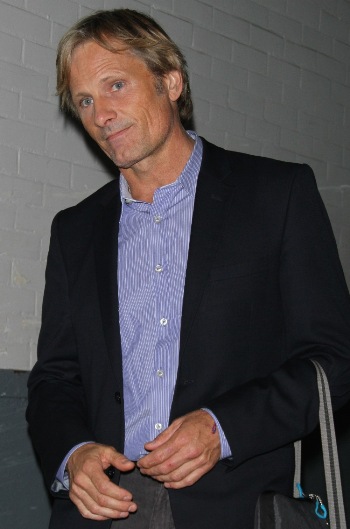 An
uncanny choice, playing such a difficult character who seems both
villain and hero, one at ease with the anti-Trump movement but also a
man who can handle his guns and knives...
An
uncanny choice, playing such a difficult character who seems both
villain and hero, one at ease with the anti-Trump movement but also a
man who can handle his guns and knives...
I read
the script and liked the first few pages. I thought, “This is great.” I
was wrong that I thought this must be some kind of liberal left wing
utopian fantasy. I guess these are the heroes. They are perfect in their
own way, and the obstacles are going to be conservative people and ideas
– some ideological kind of movie. It turned out not to be that at all.
The father took things too far sometimes. Not everything was perfect.
There was a real commitment on days in that family for the kids and
[that was] admirable, really. Maybe it will make it cool for kids to be
intellectually engaged.
Hey,
those kids knew the Bill of Rights.
I
realized, “No it’s not that and it is not entirely condoned or
condemned, and there are other ideas for raising kids.” It was a very
passionate story. Sometimes I’d just stop and go, “Wow.” Sometimes I
would stop and laugh and I was very moved. It is so good, halfway
through that I was thinking, “When is it going to fall apart and do some
predictable thing?” But it didn’t. I had no doubts that it could be a
good movie.
You are
a dad of your own as a 28-year-old man (with singer Exene Cervenka of
the band X). Were there moments when you thought, “He’s onto something
here” or did you think Cash was completely...?
As a
father, or the character?
Anyone
would think, “Could I do this to my children? Could I remove them from
what is a normal life?” Did you ever think this is something you could
have done with your own son, besides just going camping?
We did
go camping and we lived in the woods in northern Idaho with very little
[resources]. I think it is aspirational. It is imperfect, but it is
impossible to be an ideal mother or father – the perfect parent. That
doesn’t mean you shouldn’t try. It’s aspirational that this guy, Ben
Cash, devotes literally 100% of his time and energy to his kids, to the
exception of all else. He’s just there for them. It’s a tall order. You
can watch it as a parent and think, “Nice idea but how do you do that?”
But It’s not really about living in the woods or any type of family
model, it’s about being present and being flexible, which I was
surprised to find [out] when I read it. Eventually, he realizes he has
gone too far and he has the courage or common sense to try and make an
adjustment.
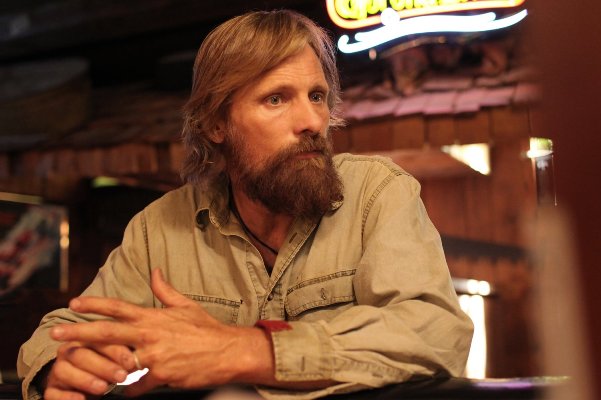 It’s not
an ideological or political movie, but when I watch this film it makes
me think about our country now, and the problem with communication.
There are people who are polarized. Obviously with the Presidential
candidates, things are very divisive. “You follow me and I will make
sure that the [other] group doesn’t have a voice.” Police issues are
very divisive. People are split into their [respective] camps and not
engaging [each other] at all in a lot of cases. Based on race, religion,
region, socio-economic class, there’s a lot of that going on. It’s not
just the media or the campaign fueling it because it sells. It’s
something going on in society, more so than ever before. In the ’90s,
during Bill Clinton’s presidency, there was a sort of cultural war, but
not since the mid ’70s has the country has been this unable to speak to
each other. There’s a lot of yelling but not face to face enough. Even
if you’re yelling, at least you’re engaging. Lots of people [are just]
not engaging. “I’ll go to my blogs, go to my source of information, I’ll
align with the people that think like I do and I won’t even talk to the
others.” That’s the problem.
It’s not
an ideological or political movie, but when I watch this film it makes
me think about our country now, and the problem with communication.
There are people who are polarized. Obviously with the Presidential
candidates, things are very divisive. “You follow me and I will make
sure that the [other] group doesn’t have a voice.” Police issues are
very divisive. People are split into their [respective] camps and not
engaging [each other] at all in a lot of cases. Based on race, religion,
region, socio-economic class, there’s a lot of that going on. It’s not
just the media or the campaign fueling it because it sells. It’s
something going on in society, more so than ever before. In the ’90s,
during Bill Clinton’s presidency, there was a sort of cultural war, but
not since the mid ’70s has the country has been this unable to speak to
each other. There’s a lot of yelling but not face to face enough. Even
if you’re yelling, at least you’re engaging. Lots of people [are just]
not engaging. “I’ll go to my blogs, go to my source of information, I’ll
align with the people that think like I do and I won’t even talk to the
others.” That’s the problem.
In the
movie, you see how not communicating and isolating has its downside too.
Yes, you want to protect your community’s model, your family’s model, or
your race’s model, [but] these are things that divides and [are]
polarizers. Eventually, you are going to have to understand if you want
to have any greater community or government that functions, you are
going to have to get involved and make compromises. It can’t all be your
way.
Yeah,
Viggo for president! You sound just as brilliant as your character is,
and it makes you think. That scene with the video games, it makes you
think that there is a different way. You may not ever take your kids to
live in the woods, but you can do things differently.
There is
a difference between being a parent that says, “No because I said so”
or, [the one who takes the time to explain] which takes a lot more time
and energy but it’s worth it. “Well I don’t think so and let me explain
why, and then you can state your case if you have a counter-argument.”
It’s
about communication.
No
matter how crazy or radical the family seems, even if you are interested
in their ideas and agree with them politically or socially, it’s still
sometimes extreme and seems radical. But underneath it, the foundation
is of constant curiosity, mutual respect, and total commitment to
improving yourself intellectually and physically. I can watch it and
think that those of us who aren’t as committed to being energetic and in
shape and read and talk to our kids, it can be daunting. You can dismiss
it and think, “Oh come on,” but there are moments where you can think,
“I can do a little of that.”
At the
end that’s what Ben does. He learns that their grandparents [played by
Frank Langella and Ann Dowd] aren’t completely nuts and have a point
about things, [as does the sister] and so forth. There’s flexibility and
willingness to listen. The thing he was so against, rigidity and
authoritarian structures, he engages in that [himself] by being so
thoroughly paranoid. By not wanting his kids to be affected by it, he’s
turning to it himself.
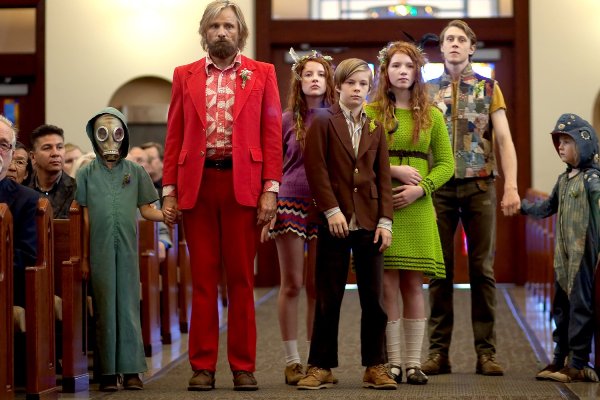 This man
is so arrogant that he almost commits child abuse, and yet he’s
brilliant too. And he’s a little nuts. But is it paranoia or arrogance?
This man
is so arrogant that he almost commits child abuse, and yet he’s
brilliant too. And he’s a little nuts. But is it paranoia or arrogance?
People
aren’t any one thing. Even the person that you know what they’re like,
even the most secluded nun, has a rich interior life and is capable of
being annoyed or changing her mind. Everybody is complicated. I like
stories about complicated people, because we all are each in our own
way. We have our secret fears.
How was
your exchange with the kids who played your children? Were they able to
quote the Constitution?
They
were pretty sharp, and they were willing to learn. After reading the
script and meeting with writer and director Matt Ross, I said it was one
of the best scripts I read in years. It’s layered, well defined, even
for the characters that don’t appear very much. There’s a lot going on.
It’s a successfully written, ambitious script. For a great script to be
a great movie in this case, though, we had to find six geniuses that are
Olympic athletes who can sing, and most importantly, express ideas
complex even for an adult about literature, science.
You have
to get lucky and work very hard. Matt was optimistic. He said we’ll find
them. If you find two out of six, you’ll have a good movie, but not a
great movie. You need six out of six, and that’s what we had. Everyone
came having practice the things they had to do, and then we had two
weeks of extensive boot camp, doing all the things together, the martial
arts, the rock climbing, building your own shelter and fire. But we
we’re incredibly and all of these kids deserve enormous credit. I had
experience and could handle all the rigors that were involved. But they
were amazing and not enough has been said about how all of them could
handle their parts.
Were you
enjoying that time in the Washington State forest or were you looking
for a Four Seasons?
I liked
it [laughs]. I thought it was important that what you see first,
their life in the woods, that you believe this is possible. This could
be real. It could be a movie where you’d take a leap of faith and say,
“How are they getting dressed? Where does that food come from?” and so
forth. It’s not justified, but you just say, “It’s a movie.” But we
thought it was important that you totally believe it. I got to look at
the terrain where it would be and said this would be a good spot to have
a garden and grow vegetables. You can’t have giant cornfields, but you
can have a certain amount of food. Matt said we should have some solar
paneling. It was fun. I spent about two weeks in rehearsal beforehand
out there just working on the garden and stuff.
So you
can really do that?
It was
fun.
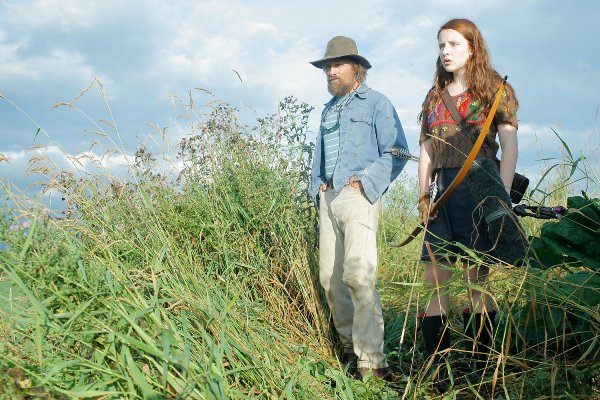 Are you
going to do that again?
Are you
going to do that again?
Uhhh...
in my life? I always play in gardens.
Did Matt
explain to you the basis for the script and whether it’s based on true
events?
You have
to talk to Matt. I wouldn’t say they’re hippies because it was the
1980s, but in Oregon and Northern California, his mom established these
communities for alternative living that were quite removed. He went to a
regular public high school, but he had to go ten miles down a dirt road
to get to an asphalt road. It took an hour plus to get to school every
day, so he felt a little like a slave [to those conditions]. I think he
identified the most with the oldest kid, who felt isolated and was
yearning to get out. In the summer they slept in a teepee. I know those
are the things he drew from. I think his main reason for writing this
was the aspirational aspect to it. How would it be if I dropped
everything? How best can I be a dad? There’s no best answer for being a
parent or raising a child, but what do they read? How much technology
and when?
Every
parent has to figure out their own way. As a dad, that was his
inspiration. It’s a case of extreme conscientious parenting. How can I
do better? There are moments in life when you say to yourself “Oh God,
everything I’m doing in life is wrong.” I think that’s healthy as long
as you don’t let that get the better of you. Just back up and say what
can I learn from this? I see Ben doing that. Ben thinking: what can I
take from what my sister or grandparents say?
Is there
anything in this film would make you do things differently as a dad if
you could?
It’s a
silly thing, but for example, my son had this thing – he’s much taller
than I am – and right into high school his thing since the time he could
crawl was, “Dad, let’s wrestle.” It could be dinner and he’d say, “Let’s
wrestle.” Most of the time I’d drop whatever I was doing and we’d roll
around. Then by the time he was 13 or 14, he was beating my ass, and I
had to really think about it. Got to stretch a little more. I should
have said yes every time, but there were times I said let me finish this
phone call. Most parents say, “I should have spent more time with them.”
This is generally. If you lose your child, it stays with you forever. I
should have called every day. You feel that in watching the movie.
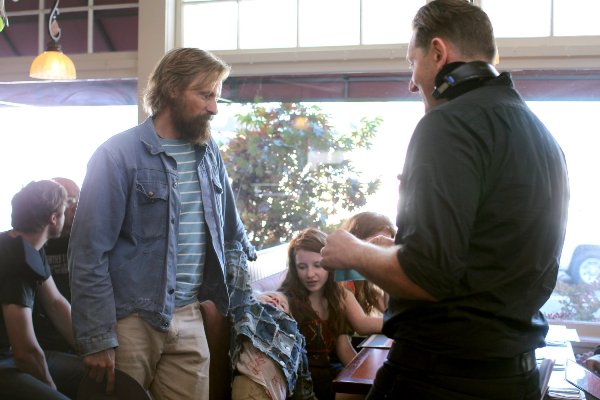 How long
until you met the mother character Leslie [played by Trin Miller]? Have
you found other mothers who feel the way your character does?
How long
until you met the mother character Leslie [played by Trin Miller]? Have
you found other mothers who feel the way your character does?
At
Cannes there was a great ovation, which was a relief because we weren’t
in the US. It was a diverse group of critics, and not only were they
moved by it, but afterwards outside the theater people were talking toys
and a lot of them were moms. It struck a chord because the whole story
is kicked off by the absence of the mom. That’s what it’s all about.
It’s really about the mom, even though we don’t see her a lot. We were
lucky that Trin played that part. As written, she just comes to him once
in that dream, but there weren’t even words. Matt, who’s very good at
making actors feel comfortable and making you feel like you have all the
time in the world — when you don’t because it’s an independent movie on
a schedule and you’re working with kids, he’d said, “Relax, have fun.”
So she
started talking – she knew the script well – and it was very moving
improvisation. I said we’ve got to see her again. You see the girls the
way they are, the way they look. She’s key even though she’s unseen. But
I said, “Let’s see her afterwards on the bus,” which wasn’t originally
in the script. It was just going to be the coffin. That’s what I like
about the movie. It might be a little crazy, but they have a healthy
relationship with death.
They’re
blunt about it.
Brutally
honesty, constant curiosity, and open. There were some moms, and people
mention the stress and serious postpartum problems and they identify
with the dad. There are lots of different things moms and daughters said
to me.
It’s was
quite painful but felt very real and touching.
You
think she’s been gone not so long, and they have this rigorous way of
life, but he might have stepped things up even more and said, “I better
not get this wrong.” He might have been overcompensating and pushing
them really hard.
Okay but
before you go we can’t dodge the matter of the frontal nudity in this?
That was very brave acting.
That’s
one of those scenes where you read it and I said to Matt that the only
reason to use this is if it helps the movie. Does it move the story
along, and is it funny? It comes after a scene that’s bittersweet and
kind of sad. After that is another sad moment. So it’s a punch line.
It’s a funny moment. It works.
CLICK HERE TO SEE WHAT VIGGO MORTENSEN
HAD TO SAY TO US IN 2007!
CLICK HERE TO SEE WHAT VIGGO
MORTENSEN HAD TO SAY TO US IN 2009!
Email us Let us know what you think.